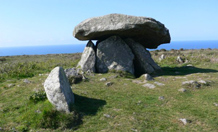-
- Information for new students
- About us
- News
- Events
- Prospective undergraduates
- Prospective postgraduates
- Employability
- Research
- Staff profiles
- Arab and Islamic Studies
- Education
- Law
- Politics
- Sociology, Philosophy and Anthropology
- Strategy and Security Institute
- Exeter Q-Step Centre
- Outreach
- Alumni
- Contact us
- Health and Safety
- Current students
- Staff intranet

Dartmoor
Report reveals value of nature to UK economy
The University of Exeter has contributed to research that reveals that nature is worth billions of pounds to the UK economy.
The UK National Ecosystem Assessment (NEA) is the first analysis of the UK natural environment’s benefits to society and continuing economic prosperity.
Professor Michael Winter and Dr Robert Fish of the University of Exeter’s Centre for Rural Policy Research were co-authors of the report, which involved hundreds of the UK’s natural and social scientists. The report’s findings strengthen the arguments for protecting and enhancing the UK’s natural environment.
As Professor Michael Winter explains: “The NEA offers a novel approach to estimating the value of the natural world by taking account of the economic, health and social benefits we get from nature”
The UK NEA examined the state of the full range of ‘ecosystem services’ provided across eight different habitats including marine, woodlands, wetlands and moorlands. It shows that while some ecosystems are getting better at delivering services, such as crop production from farmland and climate regulation by woodlands, over 30% of services assessed were found to be in decline, and others degraded, such as marine fisheries, wild species diversity and soil quality.
While in the past people may have thought that caring for the environment meant extra financial burdens, the UK NEA shows that there are real economic reasons for looking after nature. It also shows that the benefits we get to our health, well-being and from the enjoyment of nature have not always been fully appreciated or valued.
Dr Robert Fish, the lead author of the NEA’s ‘Shared Values’ chapter explains that the report will have a major influence on government policy in future: “The findings of UK NEA have shaped the priorities of the recent Natural Environment White Paper which outlines the Government’s vision for the natural environment over the next 50 years. The NEA tells us much about the economic case for looking after the environment but also how we can cultivate awareness of nature’s wider value to human well-being.”
Date: 29 June 2011
